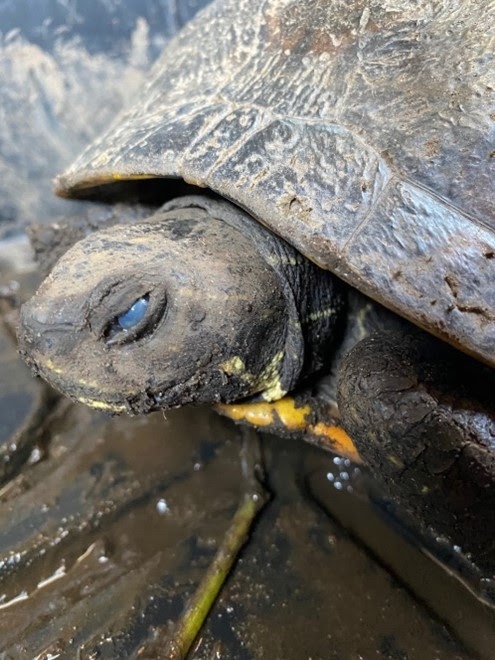Help FWC monitor freshwater turtle viral sickness or die-offs
Florida Fish and Wildlife Conservation Commission (FWC)
The Florida Fish and Wildlife Conservation Commission (FWC) continues to study a fatal virus infecting freshwater turtles statewide, and is asking the public’s assistance in reporting sightings of sick, strangely acting or dead turtles to the FWC through the Turtle Hotline 352-339-8597 or through the FWC reporter app on your mobile device.
The FWC has been studying the turtle fraservirus 1 (TFV1), formerly known as turtle bunyavirus, since early 2018. Since then, the virus has been detected in Putnam, Lake, Seminole, Orange, Polk, Osceola, Brevard, Indian River and Collier counties in Florida. TFV1 has been detected in softshells, cooters and sliders, and the first TFV1 positive common snapping turtle was discovered, earlier this year, in southern Indian River County, Florida.
A turtle may be sick if it displays any of the following signs:
• It appears sluggish, unresponsive or reluctant to flee.
• The turtle stays in shallow water or is beached on banks for prolonged periods of times.
• Its head and neck is outstretched and flat along the ground.
• Its eyes are sunken, swollen, crusty and/or cloudy.
• The skin is reddened on its head, neck, limbs or the bottom of its shell.
• It swims irregularly, such as sideways, in circles or it's unable to submerge itself in the water..
As part of the ongoing research, the FWC is asking the public for help by taking the following actions:
• Report sightings of sick, strangely acting, or dead freshwater turtles to the FWC by calling the Turtle Hotline 352-339-8597 or through the FWC Reporter App.
• If possible and without touching the turtle, take photos of the turtle.
• To avoid spreading the virus, do not capture, transport or release turtles in new locations, even if the turtle appears healthy. Executive order #21-19 prohibits the taking or transporting of all freshwater softshell turtle species or yellow-bellied sliders until the order is repealed.
• Do not eat turtles that are acting strangely or appear unhealthy.
There is no current evidence to suggest that humans or wildlife other than turtles can be infected with TFV1.
For more information about TFV1, visit myfwc.com/wildlifehabitats/wildlife/freshwater-turtles/tfv1.
Top
The Florida Fish and Wildlife Conservation Commission (FWC) continues to study a fatal virus infecting freshwater turtles statewide, and is asking the public’s assistance in reporting sightings of sick, strangely acting or dead turtles to the FWC through the Turtle Hotline 352-339-8597 or through the FWC reporter app on your mobile device.
The FWC has been studying the turtle fraservirus 1 (TFV1), formerly known as turtle bunyavirus, since early 2018. Since then, the virus has been detected in Putnam, Lake, Seminole, Orange, Polk, Osceola, Brevard, Indian River and Collier counties in Florida. TFV1 has been detected in softshells, cooters and sliders, and the first TFV1 positive common snapping turtle was discovered, earlier this year, in southern Indian River County, Florida.
A turtle may be sick if it displays any of the following signs:
• It appears sluggish, unresponsive or reluctant to flee.
• The turtle stays in shallow water or is beached on banks for prolonged periods of times.
• Its head and neck is outstretched and flat along the ground.
• Its eyes are sunken, swollen, crusty and/or cloudy.
• The skin is reddened on its head, neck, limbs or the bottom of its shell.
• It swims irregularly, such as sideways, in circles or it's unable to submerge itself in the water..
As part of the ongoing research, the FWC is asking the public for help by taking the following actions:
• Report sightings of sick, strangely acting, or dead freshwater turtles to the FWC by calling the Turtle Hotline 352-339-8597 or through the FWC Reporter App.
• If possible and without touching the turtle, take photos of the turtle.
• To avoid spreading the virus, do not capture, transport or release turtles in new locations, even if the turtle appears healthy. Executive order #21-19 prohibits the taking or transporting of all freshwater softshell turtle species or yellow-bellied sliders until the order is repealed.
• Do not eat turtles that are acting strangely or appear unhealthy.
There is no current evidence to suggest that humans or wildlife other than turtles can be infected with TFV1.
For more information about TFV1, visit myfwc.com/wildlifehabitats/wildlife/freshwater-turtles/tfv1.
